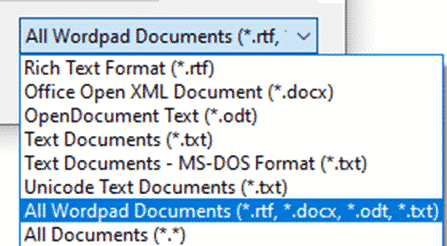One of the ‘emergency’ options to remember is WordPad, which can open Word documents, available in modern Windows 11, 10, 8.1 and 7.
Often overlooked, WordPad can be very useful. It’s always available when Windows is running even in the Safe mode. No extra install or setup needed.
It’s on the Start Menu as one of the Windows Accessories. Not ‘NotePad’ which is the other text-only editor in Windows.
The most common document formats are available, crucially the modern Word docx format.

- .docx Microsoft Office (Open XML) document
- .rtf Rich Text Format
- .odt OpenDocument Text
- .txt Text documents
Advantages of WordPad
Very low risk – WordPad is rarely a gateway for virus infections.
Low Memory – it uses a lot less memory than Word or Word Online (in a browser).
Always available – no install necessary, Wordpad is always available (except perhaps a very customized Windows install by an organization).
Common formats – .docx .rtf .odt and .txt covers most document formats.
No Internet – unlike Office Online (in a browser), WordPad doesn’t need an Internet connection.
No .DOC support
WordPad won’t open the older Word .doc files. To view .doc files, use Word Online (in a browser) or convert to .docx using an online converter.
No .DOCM support, officially
WordPad won’t open macro enabled .docM documents but that’s easily fixed.
Rename the .docm file to .docx e.g. FredDagg.docm becomes FredDagg.docx or FredDagg.docm.docx
WordPad will now open the document. Of course, none of the VBA code will run, but WordPad will let you read the basic document.
Free and secure conversion of .doc .xls or .ppt to the newer Office formats
Why Old Office documents should be banned
Why you should delete .doc .xls or .ppt files